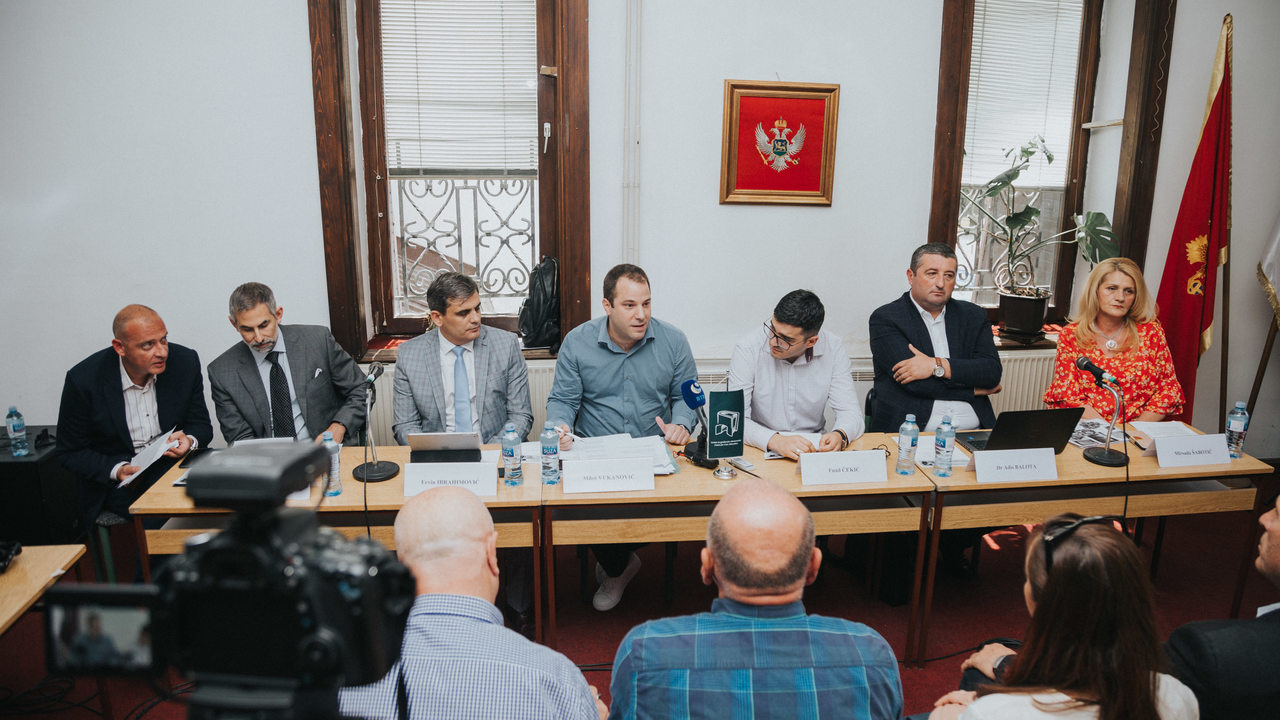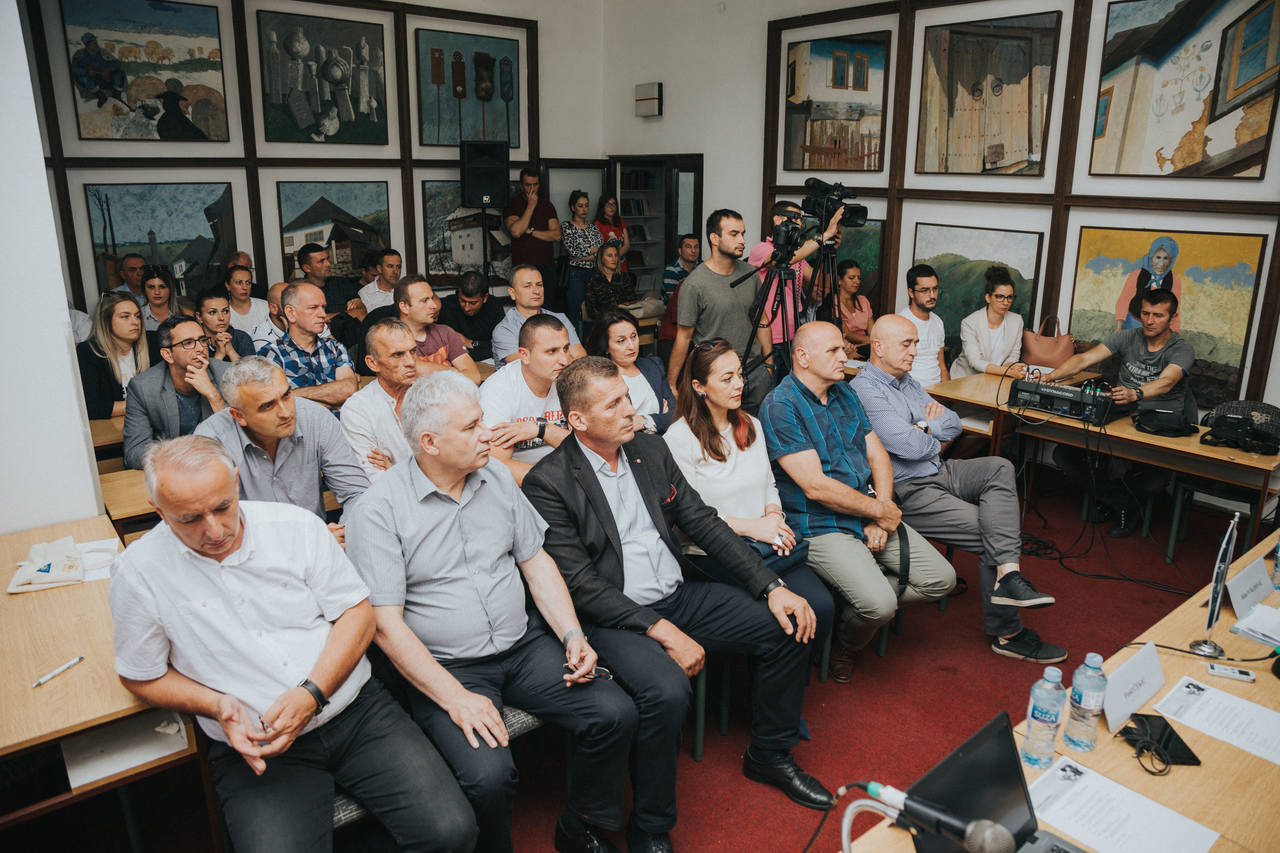Although extremists who propagate certain attitudes are usually identified as persons with religious, sociological or political motives, large number of these extremist radical attitudes are linked to some economic gain and are not related to one of these three motives, as it was concluded at the final public debate ‘Dialogue in the community – prevention of radicalization and violent extremism’ organized by the Centre for Civic Education (CCE) in Rožaje.
Milos Vukanović, historian and CCE Programme Associate, pointed to the importance of action from the local and educational level. ‘The education system and the local community are on the first ‘front line’ to prevent the spread of radical and extreme ideas. The activities of these projects are going along in that direction with the emphasis on the ‘networking’ of educational staff and the incentives for education to promote values by which we will oppose to extremist elements. Also, the importance of improving the equality and respect for minority people, knowledge and understanding of multicultural and intercultural diversity, as well as confronting and discussing controversial and different attitudes are the natural companions of this process’. He stressed that young people in Montenegro are learning too little about the diversity of their country. ‘We are proud of our long history of tolerance. However, does the state and the education system adequately spread knowledge about the essence of our state? Isn’t it devastating that, in small Montenegro, students in high school do not know that in their state there are municipalities and cities in which the most of the population is of another religion or where there is another official language?’, Vukanović said.
Ervin Ibrahimović, Head of the MP Group of minority parties in the Parliament of Montenegro and member of the Bosniak Party Presidency, emphasized the importance that the multi-ethnic and multireligious harmony, good neighbourly relations and dialogue commit us to preserve those values. ‘Montenegro has rich historical heritage. Many people with different motives can try to endanger this heritage when they perceive something or present it as danger, fear, hostility, as well as to try to excommunicate diversity or other nations from the society’. Ibrahimović praised the work and contribution of the Ministry of Human and Minority Rights and the Ministry of Culture in promoting different cultures, as well as draft laws protecting the diversity of cultures and particularities of minorities in Montenegro. He also emphasized the importance of the Fund for the Protection and Exercise of Minority Rights and the Centre for Preservation and Development of Minority Culture, as well as non-governmental organizations that set Montenegro as a positive example of a multi-ethnic and multi-religion harmony as one of the basics of the modern state. ‘The greatest danger is fear. Therefore, we need to get to know better and neutralize fear, and by joint promotion of humanity, clear condemnation of hate speech, intolerance, and those who promote it, we have to work to suppress radicalism’, concluded Ibrahimović.
Lewis Gitter, Head of the Political and Economic Section at the US Embassy in Podgorica, spoke about efforts made by the US Government in the prevention and fight against terrorism at global level. He emphasized the importance of creating partnerships and networking between leaders from the governmental, religious and civil sectors in educating communities on how to better protect themselves and help those with a tendency to radical behaviour before they are recruited by terrorists. ‘Terrorism exists in a broad ideological spectrum’, Gitter noted. He recalled that these movements feed themselves, leading to reciprocal radicalism. Gitter said that the prevention of terrorism is an essential part of a comprehensive social approach to the fight against terrorism. ‘Prevention is a ‘soft power’ we use to ensure that people do not radicalize, mobilize, recruit or inspire others to commit terrorism. The prevention of radicalism is complementary to military actions and law enforcement by competent investigative and judicial authorities’, Gitter underlined. He pointed to the power of women and the fact that they are not enough recognized as partners in these efforts. Furthermore, he emphasized that at the global level, the State Department has helped in establishing the Strong Cities Network that gathers 125 local governments from six continents, including Rožaje, to share good practice in creating partnerships in communities and strengthening the resilience of vulnerable youth.
Fuad Čekić, director of the Madrasah ‘Mehmed Fatih’, emphasized that the attempt to penetrate into the essence of God’s will is the most important in monotheistic religions. ‘God creates a world in diversity, not just a human one, but in total creation: of the same kind, of race, of diverse thoughts, of religion … On the other hand, unlike God, man is striving to unify’, he said. Within all these differences, according to him, there is something that is common to all – universal human values. ‘People were created in the same way and divided into different nations in order to get to know each other’, said Čekić decisively. It is his view that the term tolerance has a negative definition to the one who is different, because it implies one to get used to enduring the other and something that causes negative consequences, because the expression of that victim has a limit. ‘We need to study diversity, to learn from each other the differences from individuals to the people, and not to tolerate one another. No one can be put into religion by force, because religion seeks freedom, seeks to be spoken of. It only seeks the power of arguments and the right to freedom of religion, and in no way imposing religion through coercion’, explained Čekić.
Dr Adis Balota, Dean of the Faculty of Information Technology of the Mediterranean University, emphasized the importance of dialogue in suppressing radicalization and extremism. He recalled that 95% of all communications are happening in cyberspace, that four billion are using internet and that more than 150 hours are posted on Youtube every 60 seconds, pointing out that extremists recognize that as a resource. ‘The virtual world brings a lot of benefits, but also the danger, because criminal groups use this space as well. If you speak at least one world language, you can get information on how to create, in thirty days, weapons that can cause mass destruction’, Balota warned. He emphasized that the most vulnerable groups to the extremist and radical views are young people and women. Regarding prevention, Balota emphasized the importance of family, community and media, education and teaching staff through primary and secondary schools, but also formal and non-formal education. “The most effective and cheapest way to combat radicalization is education, by which young people with a certain degree of skills, competence and knowledge become ‘more resistant’ to all of these attitudes and influences’, he concluded.
Mirsada Šabotić, professor in the Gymnasium ‘30 May’, thinks that the emergence of deviant ideas is not an issue only for psychologists, but for the whole world that should seek a more humane society. “Breaking walls of nationalism, fascism in our region, remedying consequences of war can be best done through people’s rapprochement, and especially through linking young people in order to realize that we are different and that diversity should unite us’. She highlighted the work of the teachers in Rožaje, who in the last three months have been implementing the Magic Intercultural Network project through which thirty schools have been connected around the world and children from different parts, religions and cultures have been able to meet each other, what she sees as one of the ways of breaking prejudices among them. ‘We need to work to make people understand that we need to love, respect and value each other, get to know each other and connect in our diversity’. She also emphasized the importance of the education system. ‘It is necessary to increase the number of civic education classes, and to introduce more subjects that will promote humanity into the framework of regular class time. We have knowledge, we need humanity’, said Šabotić.
The public debate in Rožaje gathered over 50 councillors of Parliament of Rožaje, representatives of non-governmental sector, political parties, employees in the municipality, teachers, and others. It was organized within the framework of two projects Safe Net and Education for Multiculturalism and Interculturalism, supported by the US Embassy through the Fund for Active Citizenship (fAKT) and the Ministry of Human and Minority Rights of the Government of Montenegro.
Maja Marinović, Project Assistant


